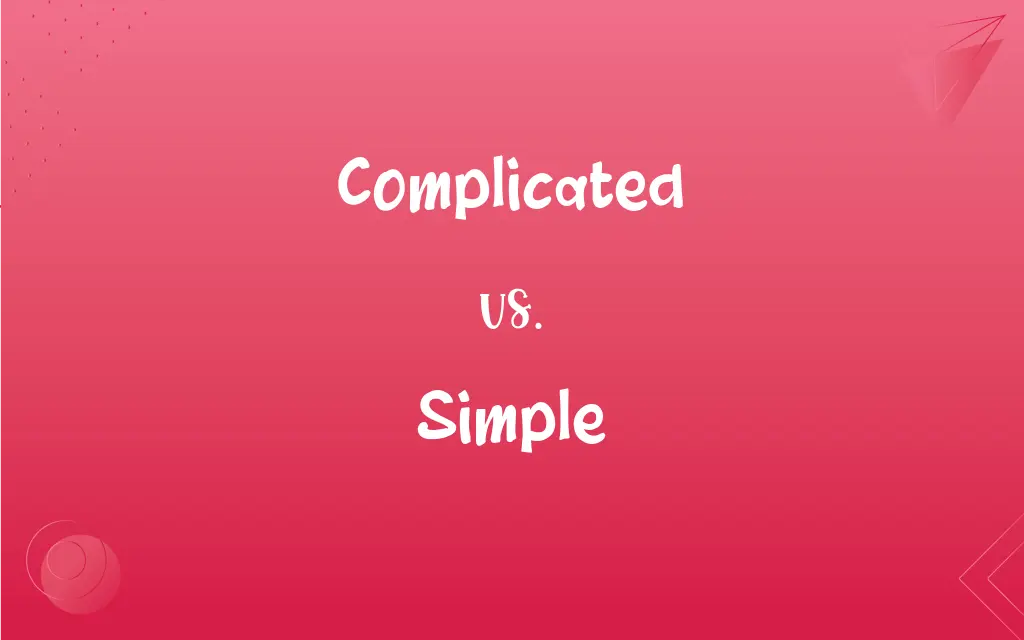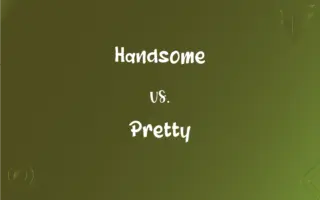Complicated vs. Simple: What's the Difference?
Edited by Harlon Moss || By Janet White || Updated on November 20, 2023
Complicated refers to involving many elements in a tangled or intricate manner. Simple refers to easily understood or done; presenting no difficulty.

Key Differences
Complicated refers to something with multiple layers, often difficult to understand or solve, while simple denotes clarity and ease, free from complexity. In essence, complicated things require more effort to comprehend or manage compared to the straightforward nature of simple things.
When something is complicated, it typically involves numerous parts or aspects, which can make it challenging to grasp or deal with. On the other hand, simple implies a direct and uncomplicated approach, often characterized by a lack of intricacy or sophistication.
The term complicated often suggests a higher level of complexity, possibly leading to confusion or difficulty in understanding. In contrast, simple signifies an easy-to-understand or straightforward attribute, making things more accessible and less daunting.
In problem-solving, a complicated issue may require in-depth analysis and multiple steps to resolve, indicating complexity. Meanwhile, a simple problem is usually solved with minimal steps and clear, straightforward logic.
Complicated can also imply a situation or subject that is convoluted and challenging to navigate, often requiring specialized knowledge or skills. Simple, however, denotes something that is unambiguous and easy to engage with, often understandable by a wide range of people.
ADVERTISEMENT
Comparison Chart
Nature
Involves multiple, often interconnected parts.
Lacks complexity, straightforward.
Understanding
Requires deeper analysis to understand.
Easily grasped or understood.
Solution
Solutions are multi-step and intricate.
Solutions are straightforward and direct.
Appeal
Can be overwhelming due to complexity.
Accessible and easy to relate to.
Expertise
Often requires specialized knowledge.
Generally understandable without special skills.
ADVERTISEMENT
Complicated and Simple Definitions
Complicated
Difficult to analyze or understand.
The complicated math problem took hours to solve.
Simple
Easily understood.
The instructions were simple and easy to follow.
Complicated
Complex in nature or character.
The novel's plot was complicated and full of unexpected twists.
Simple
Straightforward, not complex.
The problem had a simple solution.
Complicated
Intricately detailed.
The watch was complicated, with numerous small gears and parts.
Simple
Uncomplicated in form or nature.
He preferred a simple, minimalist lifestyle.
Complicated
Consisting of many interconnected parts.
The complicated network of roads made navigation challenging.
Simple
Plain or basic.
She dressed in a simple yet elegant style.
Complicated
Causing difficulty or confusion.
Their relationship was complicated, marked by frequent misunderstandings.
Simple
Not elaborate or artificial.
The recipe called for simple, natural ingredients.
Complicated
Containing intricately combined or involved parts.
Simple
Having few parts or features; not complicated or elaborate
A house with a simple floor plan.
Complicated
Not easy to understand or analyze because of being intricate
A complicated personality.
Simple
Easy to understand, do, or carry out
A simple set of instructions.
A simple chore.
Complicated
Difficult or convoluted.
It seems this complicated situation will not blow over soon.
Simple
Having or composed of only one thing, element, or part
A simple chemical substance.
Complicated
(biology) Folded longitudinally (as in the wings of certain insects).
Complicated
Simple past tense and past participle of complicate
The process of fixing the car engine was complicated by the lack of tools.
Complicated
Difficult to analyze or understand;
A complicated problem
Complicated Middle East politics
FAQs
Is 'simple' always better than 'complicated'?
Not necessarily. The preference for simple or complicated can depend on the context and the individual's perspective.
How can I simplify a complicated situation?
By breaking it down into smaller, more manageable parts and focusing on one aspect at a time.
Can simple things become complicated?
Yes, simple things can become complicated if additional layers or complexities are added.
What makes something complicated?
Something becomes complicated when it has multiple interrelated parts or layers, making it difficult to understand or solve.
Can something be both simple and complicated?
Yes, something can appear simple on the surface but reveal underlying complexities upon closer examination.
What's a real-life example of a simple concept?
A light switch is a simple concept—flip it on for light, off for darkness.
What's a real-life example of a complicated concept?
Quantum mechanics is a complicated concept, involving complex theories about matter and energy.
Why do people often prefer simple explanations?
Simple explanations are easier to understand and remember, making them more accessible to a wider audience.
Is simplicity always obvious?
Not always. Some simple concepts may require a deeper understanding to appreciate their simplicity.
Does 'complicated' mean 'impossible to understand'?
No, complicated means that something requires more effort to understand, but it's not necessarily impossible.
Does technology make life simpler or more complicated?
It can do both, depending on how it's used and the user's perspective.
Is 'complicated' always a negative trait?
No, in some contexts, being complicated can be beneficial, such as in complex problem-solving.
Are simple solutions always the best?
Not always. Sometimes a more complicated solution is required to fully address an issue.
Can a person's thinking be complicated?
Yes, a person's thinking can be complicated, reflecting deep or intricate thought processes.
Can art be both simple and complicated?
Yes, art can be visually simple while conveying complex themes or emotions.
How do I know if a problem is simple or complicated?
Assess the number of factors involved and the level of understanding required to solve it.
Do people perceive simplicity and complexity differently?
Yes, perceptions of simplicity and complexity can vary greatly among individuals.
Can education turn complicated concepts into simple ones?
Yes, education can help simplify complex concepts by breaking them down and explaining them clearly.
Can simplicity lead to innovation?
Yes, simplifying processes or concepts often leads to innovative solutions.
Is a 'simple life' devoid of complexity?
Not necessarily. A simple life focuses on the essentials, but can still have meaningful complexity.
About Author
Written by
Janet WhiteJanet White has been an esteemed writer and blogger for Difference Wiki. Holding a Master's degree in Science and Medical Journalism from the prestigious Boston University, she has consistently demonstrated her expertise and passion for her field. When she's not immersed in her work, Janet relishes her time exercising, delving into a good book, and cherishing moments with friends and family.
Edited by
Harlon MossHarlon is a seasoned quality moderator and accomplished content writer for Difference Wiki. An alumnus of the prestigious University of California, he earned his degree in Computer Science. Leveraging his academic background, Harlon brings a meticulous and informed perspective to his work, ensuring content accuracy and excellence.































































